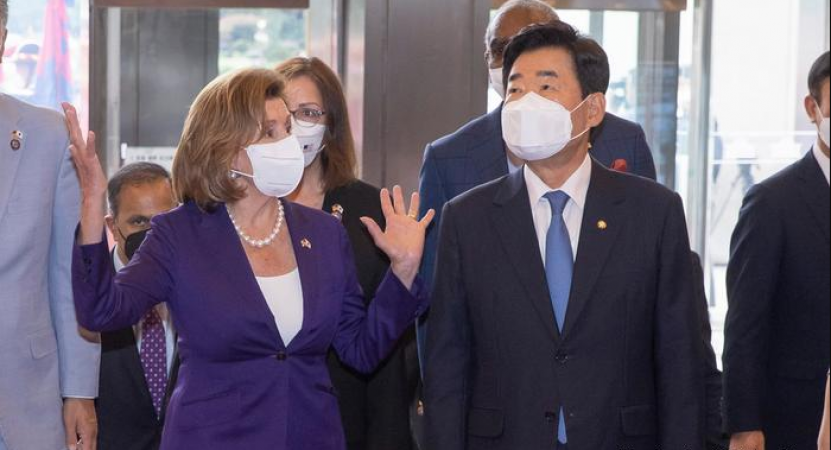
South Korea: In a statement released on Thursday, US House Speaker Nancy Pelosi and her South Korean counterpart Kim Jin-pyo expressed concern over growing threats from nuclear-armed North Korea, but addressed the unrest caused by the US official's visit.
Speaking from a joint press release after his meeting with Pelosi, National Assembly Speaker Kim said both sides had expressed concern over the "grave situation in which the level of threat to North Korea is rising".
"We agree to support the efforts of the two governments for denuclearization and peace through international cooperation and diplomatic dialogue based on a powerful and expanded deterrence against North Korea that our people can recognize," the statement said.
However, phrases such as China and Taiwan were conspicuously absent in the joint statement. China launched a harsh live shelling around the island on Thursday in retaliation for Pelosi's provocative visit; Beijing views Taiwan as a rebel province that needs to be united. North Korea called the US "the mastermind of nuclear proliferation" and said it would not tolerate any violation of its sovereign rights. It also threatened to "never tolerate" US criticism of its nuclear program.
This year, Pyongyang has conducted an unprecedented number of missile tests, and according to international experts, it is getting ready to conduct its seventh nuclear test since 2017. A month-long UN conference to review the Treaty on the Non-Proliferation of Nuclear Weapons was taking place when a statement was issued by the North's Permanent Mission to the United Nations on Wednesday.
During the meeting, US Secretary of State Antony Blinken said the North was "preparing to conduct its seventh nuclear test" and that it "continues to expand its illegal nuclear program." According to Kim and Pelosi, the US-South Korean alliance, previously founded around security and defence, is now becoming more comprehensive and includes both the economy and technology. According to the statement, the two speakers agreed to provide parliamentary support to help transform the coalition into a global one.
Pelosi emphasized that her Asia visit was part of efforts to reaffirm America's commitment to its friends and allies in the Indo-Pacific region with a focus on economic cooperation, democratic governance and shared security.
On Thursday, Pelosi was to move to the heavily fortified demilitarized zone (DMZ) where North and South Korean forces are stationed side-by-side. Ever since then-President Donald Trump met North Korean leader Kim Jong-un in 2019, she will become the highest-ranking US official to visit the inter-Korean ceasefire village of Panmunjom.
South Korean President Yoon Suk-yol has come under criticism for not meeting Pelosi in person while on leave this week. Eun Suk-yol and Pelosi talked on the phone.
According to a senior aide, during a 40-minute phone call, Yoon told Pelosi that his visit to Panmunjom would be a "sign of deterrence" and that he would work closely with the US Congress to strengthen the bilateral alliance. Pelosi argued that the Allies should work together to create a "free and open" Indo-Pacific order.
Yun's refusal to meet with Pelosi would send a "wrong signal" to the US and China, according to a conservative Chosun Ilbo editorial.
It was noted that Pelosi had met with former President Park Geun-hee during his most recent visit to Seoul in 2015 and that Yoon was elected on a platform to strengthen the US-South Korea alliance.
Since China is South Korea's largest trading partner and North Korea is a key country in the nuclear issue, the newspaper advised caution in dealing with China. "However, it is feared that relations between China and South Korea will continue to deteriorate if the government maintains a polite attitude towards China similar to the administration of (former liberal president) Moon Jae-in.

According to another conservative daily, the Dong-e Ilbo, the US-China conflict, which is "heading towards its worst," will undoubtedly put "a significant burden on South Korea as well".
Dong-A reported that "North Korea's nuclear issue is likely to be shelved in light of the Taiwan Straits crisis, and South Korea will face increasing pressure from Washington to play its role as an ally." "
Despite protests from Seoul, the 28,500 US troops stationed there could be moved elsewhere in the region, and Washington would pressure Seoul to agree to the deployment of new medium-range missiles aimed at China. It said South Korea would face increasing pressure to join a "Chip 4" alliance with Japan, Taiwan and the US to create a reliable supply chain free of China.
In light of rising tensions in the Taiwan Strait and conflict over semiconductor security, the paper urged government caution, stating that it was "unclear where the sparks of the furious Chinese reaction will fall."
Former People Power Party lawmaker Yoo Seong-min criticised the president's diplomacy over his refusal to meet with Pelosi, calling it "inconsistent."
Yoon, who has been living at home since Monday, went out with his wife on Wednesday to see a play just before Pelosi touched down at a US airbase in Osan, 42 kilometres south of Seoul.
Yoo posted on Facebook that it was "inexplicable" that the president would not meet the No. 2 from Washington while he had free time to watch a play and attend an after-party. "The government's erratic diplomatic behaviour during its first months in office won't be helpful for our national interests." Ironically, the opposition praised Yoon for his inaction.
Yoon's vocal detractor and opposition Democratic Party of Korea lawmaker Kim Eui-gyeom went out of his way to praise Yoon for avoiding Pelosi. Yoon meeting Pelosi amid escalating US-China tensions is like "jumping into the fire while carrying a powder keg on the back," he said.
New York McDonald's employee was shot in the face
Pelosi departs from Taiwan China spoke extensively about her visit